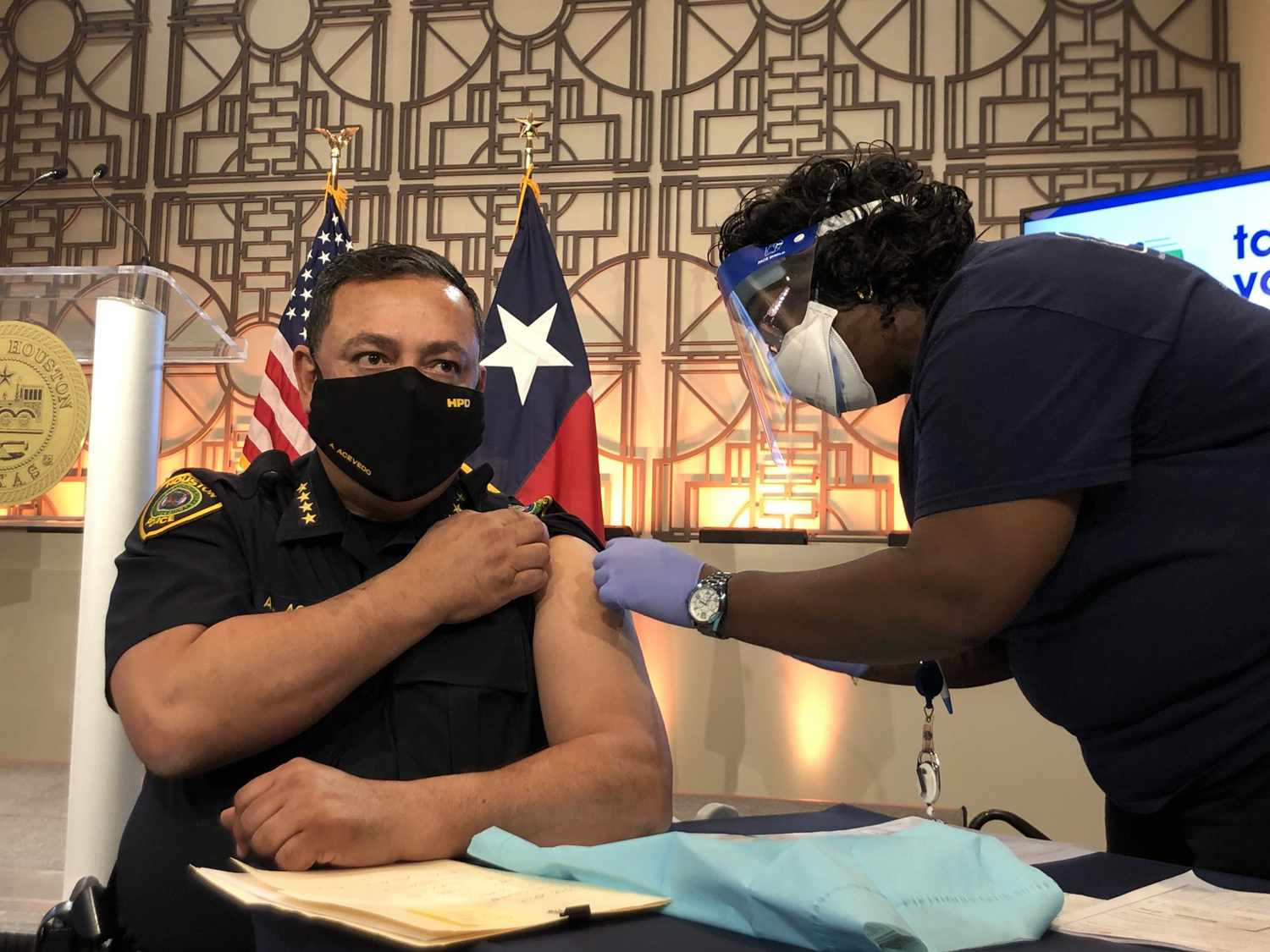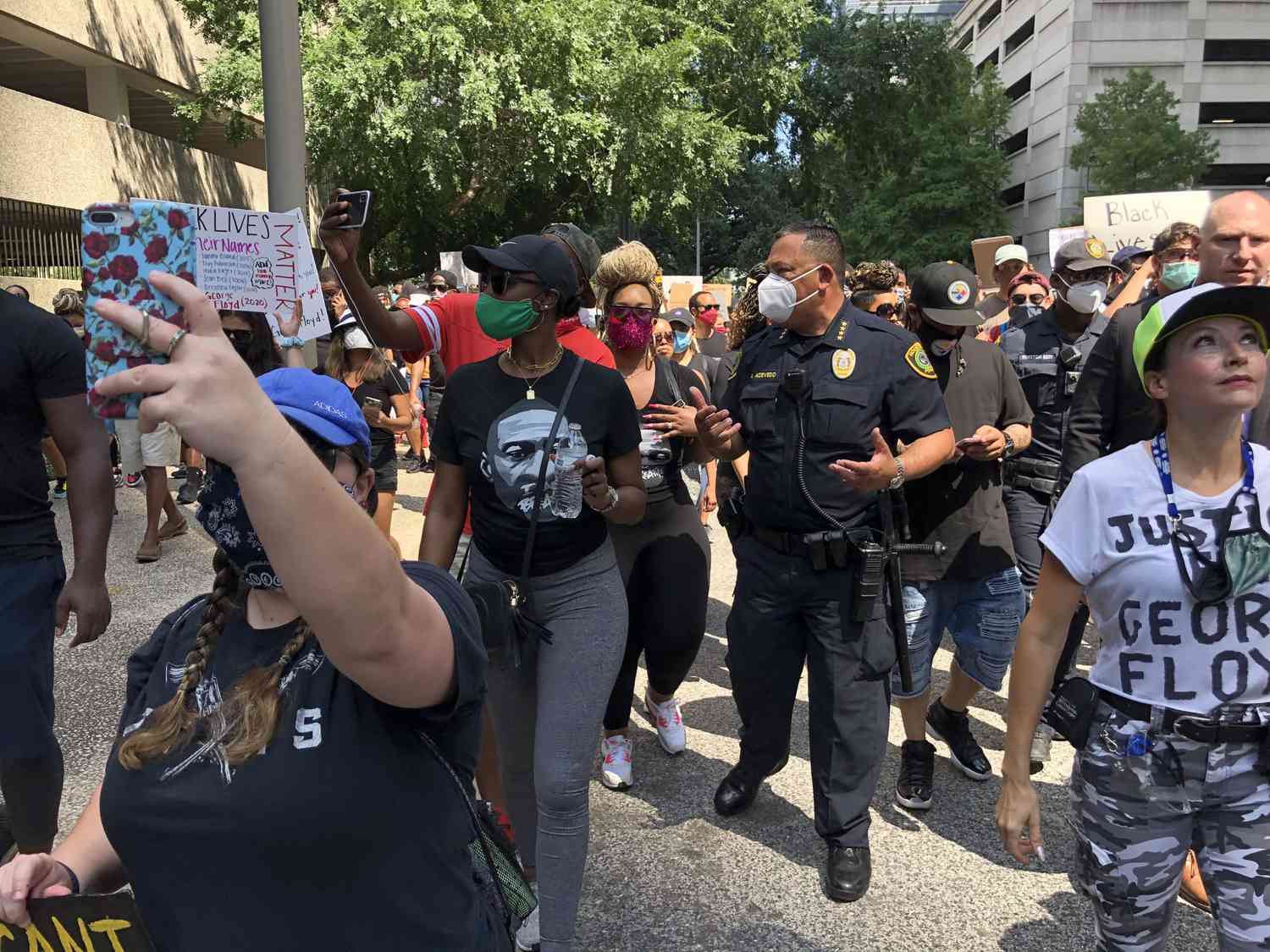
Houston Police Chief and President of the Major Cities Chief's Association, Art Acevedo, 56, promised Black Lives Matter activists he would march with them until his feet bled, in order to keep everyone safe and help protestors exercise their first amendment rights. He continued to use his position to promote public health and safety when he joined Houston's Mayor, Fire Chief and members of the city council on Jan. 4 to publicly the first dose of the Moderna Vaccine to instill confidence in the vaccine among people of color. Acevedo shares with PEOPLE in his own words why getting vaccinated was important to him.
I got the first dose on January 4th, and the second dose on February 1. I wanted to have all my cops go [ahead of me], but we're having a challenge in Houston. The mayor noticed that a lot of African-Americans and Hispanic members of our community just didn't seem to be showing up at the sites where the city was providing vaccines – obviously, free of charge. It seems like there's a lot of skepticism in those communities. The mayor, Sylvester Turner, who is African-American, wanted me to be part of a press conference where he, the Fire Chief, Sam Peña, and I all received the vaccine.
It was important for me to get the shot, not just from a personal health standpoint, but also as a public awareness and education campaign to help encourage people to actually take the shot. I want to stay healthy, but the primary reason I got it is because we wanted to really reassure skeptics in the community and society.
Last week, when I got my physical, I asked a health care worker if she had gotten the vaccine, and she said she wanted to wait a few years. I told her this is not a new virus, and the science upon which the vaccine was developed is a long-existing science. I also told her, "I've had both of my vaccines and look at me, my hair is still on my head, my pulse is good, my all my vitals are great. So far so good." She laughed and said, "All right, I'll give it a second thought."
We have to do everything we can, because the sooner we all get vaccinated, the sooner we can reach, hopefully, a normal — or a new normal, that's not too far removed from our historical normal.
And secondly, I just believe wholeheartedly that it's really going to save lives. Not only that, it will also help tamp down the emotional and the economic toll that COVID-19 is having on families in our country.

As we speak, more officers are being vaccinated. They've all been encouraged to be vaccinated, and I'm happy to report the majority of them are absolutely getting vaccinated.
We've had more demand so far than we have supply, but once we get everybody that's volunteered, I'm actually contemplating making it a requirement for all of our posts. That's something that I'm already reviewing with our legal team, because I really believe that as first responders, we're not only putting ourselves at risk, but we're putting the public at risk if we don't get the vaccine.
The reason for that is, since May, my department has been averaging over 300 people — mostly frontline first responders — off work on any given day because of COVID. We need to keep our workforce healthy, because we need them out serving the community, and not at home, or in a hospital fighting this virus. When you look at a department that hasn't grown in 22 years — despite the city's population exploding — we can't afford to have officers off in large numbers.
I can tell you that there were a couple of [vaccine] skeptics initially, but one of our sergeants that was part of the vaccine trial was actually exposed to COVID, and to this day, that officer remains negative. You would have thought he would have caught it, and he didn't. I think that helped win over some of the skepticism in my own department. I'm glad that our officers had the courage to volunteer [for the trial].
Police officers are leaders within their own families, and their extended families; they're leaders in their neighborhoods, and they're leaders in their communities. It does set that example, that if it's good enough for America's Finest, it should be good enough for the rest of the society.
I was extremely worried about catching COVID-19 during the summer protests. My family was really worried. But as police officers, we always talk about risk: There's reckless, there's risk averse, and there's risk appropriate. And when we were dealing with trying to win the hearts and minds — and build trust, that was badly damaged by George Floyd's death — it was a risk that I felt needed to be taken.
Sometimes you have to take risks.
And at times, I even didn't have my mask on. It's very difficult in those circumstances to communicate, when we're surrounded by thousands of screaming people. And sometimes, it's difficult to have that human connection, when you're socially distancing and wearing your mask. It was just a spur-of-the-moment situation where I had to take it off to connect; I felt that the mission of building trust and gaining trust outweighed the risk.
I'll be honest with you, every time I went out, I said a prayer to God, "I'm doing your work. I don't want to die from this stuff." Thank God, I did not get sick.

Now that I've been vaccinated, I know it's about four more weeks to develop a full immunity. We know it's about 95 percent effective. I do feel good that I got the vaccine, but I don't want to be one of the 5 percent – so I'll still continue to socially distance and follow the guidelines of public health experts.
I want to stay healthy and not be a victim, or a statistic. But the primary reason I got it is because we wanted to reassure skeptics in the community and society.
We really do have a moral duty to get it, to protect the people we're coming in contact with.
There's no 100 percent guarantee that you won't still spread the virus if you've been vaccinated. So that means doing everything you possibly can is really critical.
We have to do everything we can: Take the vaccine, utilize eye protection, gloves and masks, because it's about protecting one another. And while there's no 100 percent guarantee, the more we do, and the more steps we take, the better off I think we're all going to be.
Before being released to the public, vaccine-makers went through large, lengthy clinical trials to ensure that their product is completely safe. On Sept. 8, nine of the leading vaccine makers — including Pfizer and Moderna — signed a pledge vowing to follow "high ethical standards" and not rush a vaccine into production before it is proven to work.
As information about the coronavirus pandemic rapidly changes, PEOPLE is committed to providing the most recent data in our coverage. Some of the information in this story may have changed after publication. For the latest on COVID-19, readers are encouraged to use online resources from the CDC, WHO and local public health departments. PEOPLE has partnered with GoFundMe to raise money for the COVID-19 Relief Fund, a GoFundMe.org fundraiser to support everything from frontline responders to families in need, as well as organizations helping communities. For more information or to donate, click here.
Source: Read Full Article